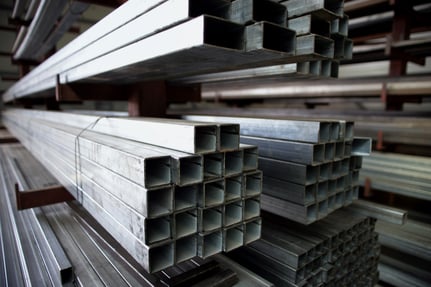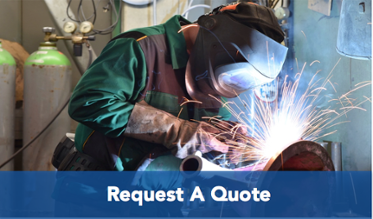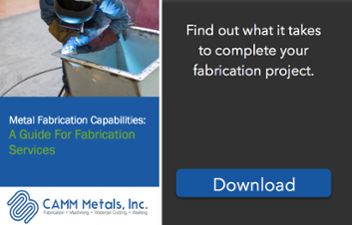T he short answer is iron! Ferrous metals contain iron, while non-ferrous metals do not contain iron. However, the difference in the composition of these types of metals means that each has unique qualities and uses. So let's learn more about the differences between ferrous and non-ferrous metals.
he short answer is iron! Ferrous metals contain iron, while non-ferrous metals do not contain iron. However, the difference in the composition of these types of metals means that each has unique qualities and uses. So let's learn more about the differences between ferrous and non-ferrous metals.
Ferrous Metals
As we mentioned earlier, ferrous metals are types of metals that contain iron. Since ferrous metals are known for their strength and durability, they are often used in both architectural and industrial fabrication. Due to the iron they contain, ferrous metals are also magnetic. Some examples of ferrous metals include:
- Steel
- Steel is made by adding iron to carbon, which strengthens the iron. This type of metal is frequently used in construction and manufacturing industries.
- Alloy steel
- Alloy steel is created by incorporating elements such as chromium, nickel or titanium to enhance the metal's durability and strength without increasing its weight. This type of metal is often used in manufacturing related to construction, machine tools, and electrical components.
- Carbon steel
- This metal's higher carbon content makes it one of the hardest steels available. Carbon steel is often used when manufacturing machine tools such as drills and blades.
- Stainless steel
- One of the most durable types of steel due to its ability to self-heal. Stainless steel is also heat and corrosion-resistant. Due to its durability and resistance to corrosion, stainless steel is used to manufacture a variety of tools and appliances such as surgical instruments, storage tanks, grills, refrigerators, and pipes.
- Cast iron
- Cast iron manages to be strong and very brittle at the same time. This kind of metal is often used when manufacturing engine blocks and manhole covers
- Wrought iron
- An alloy with very little carbon content, wrought iron is resistant to corrosion and oxidation due to the addition of slag during manufacturing. This type of metal is often used for manufacturing chains, barbed wires, and railings.
Non-Ferrous Metals
Although non-ferrous metals are typically not as strong as ferrous metals, their lack of iron does give them some advantages. Non-ferrous metals are far more malleable and have a higher resistance to rust and corrosion. Some examples of non-ferrous metals include:
- Aluminum
- This metal has low strength but is very light and highly malleable. Its lightweight makes it ideal for the manufacturing of aircraft or food cans.
- Copper
- Copper is malleable and has high conductivity for electricity and heat. Due to its incredible conductivity, this type of metal is often used when manufacturing wires or other conductors.
- Zinc
- Zinc is stronger than most non-ferrous metals and has a very low melting point. This type of metal is often used in galvanization (the process of applying a protective coating to iron or steel to prevent it from rusting)
- Brass
- Brass is a combination of copper and zinc. This type of metal is often used when manufacturing ornaments and electrical fittings.
- Lead
- This heavy malleable metal has a low melting point and low tensile strength. Since it is highly resistant to corrosion, lead is often used in electrical power cables, batteries, and building construction.
- Tin
- An extremely soft and malleable metal, tin is often used to coat steel to prevent corrosion. This type of metal is widely used for plating steel cans that contain food and in metals used for bearings.
CAMM Metals | CT Metal Fabricator
While ferrous and non-ferrous metals are different, one is not necessarily superior to the other. Context matters. Each material has its unique advantages and disadvantages-- the key is matching the metal best suited to the job requirements.
It's crucial to do your research when choosing a metal fabrication, as not all companies are capable of completing the same quality of work. CAMM Metals has years of experience, honing our skills across the board to deliver a quality product and measurable bottom-line value to our customers.



